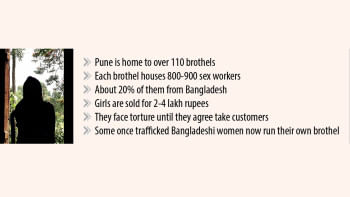An escape from ‘hell’

What began as a promising opportunity towards a better life turned into a harrowing ordeal for Junaeid Hossain Parbez Ariyan, 25, of Narsingdi's Belabo.
He fell prey to an international human trafficking syndicate and was forced to work for an online scam gang operating in Myanmar's Karen State.
Ariyan was among approximately 300 individuals, including women, held captive in at least 10 confinement centres near the Thai-Myanmar border. Thirteen of these victims are Bangladeshis.
The captives are subjected to work under inhumane conditions and tortures.
On October 18, Ariyan managed to flee from one of those confinement centres, which are guarded by armed members of Karen insurgent groups and criminal gangs. He jumped into a river, surviving an arduous trek through hills and forests.
He returned home on November 14 and shared his harrowing experiences with this newspaper recently.
DREAM TURNS INTO NIGHTMARE
Ariyan had previously been working in Dubai's hospitality sector.
In August, he was enticed by the promise of a lucrative computer operator job in Thailand, offering a salary of US $1,200–$1,500 -- twice his salary in Dubai.
Convinced by a broker, Noman, a Dubai expatriate from Feni, and recruited after an online interview with a Chinese recruiter, Ariyan and four of his Bangladeshi roommates left for Thailand on August 12, hoping for a better life.
Upon arriving in Bangkok, they were taken to Mae Sot, a Thai town near the Myanmar border. The six-hour drive ended abruptly when they were transferred into pickup vans, escorted by armed men, and driven through hilly roads and dense forests.
"For the first time we realised we have made a grave mistake," Ariyan said.
Then the group was made to cross the Moei River on a boat, and they reached Karen, a region plagued with insurgency.
The victims were taken to a compound operated by Chinese syndicates. Their mobile phones were confiscated, and they were coerced at gunpoint to sign contracts obligating them to generate US $200,000 each through online scams within 18 months, or face prolonged servitude.
The captives were forced to work 17 hours per day. Their task was to create fake social media IDs using cellphone numbers of different countries and befriend targets worldwide, posing as attractive women, to scam them.
Afterwards, they would lure targets into investing in fake e-commerce platforms, embezzling significant sums of money.
Ariyan said he alone generated US $25,000 before his escape.
Each of the captives is given a target to befriend 80 targets a day. Failing to meet quotas resulted in brutal punishments.
"We were beaten, subjected to electric shocks, and burnt with hot frying pans. Some women endured additional horrific treatment, such as being forced to stand for hours with heavy water drums on their shoulders," Ariyan said.
He said at one point he gained the confidence of a Chinese boss and got his mobile phone back and secretly informed their terrible conditions to families and relatives. They sought the government's help but to no avail.
"Seeing no light at the end of the tunnel, I got frustrated and attempted to commit suicide several times," Ariyan said in tears.
A DARING ESCAPE
On October 18, while escorting a Pakistani victim to a clinic near the Moei River, he saw an opportunity to escape. He jumped into the river despite being fired at by armed guards. After swimming for over 45 minutes, he reached the Thai side of the river.
As the gang members started searching for him, he trekked through hills and forests to escape them, before reaching a road after over eight hours.
"My legs were bleeding from cuts I sustained while running through forest. I was so thirsty that I had to drink water from a maize field," he said.
Weak and dehydrated, he stumbled upon a Buddhist monk who helped him contact local authorities.
Ariyan spent weeks in a Thai shelter for trafficking survivors before being sent home with the assistance of the Thai government, NGOs, and the Bangladesh Embassy.
He urged the government to take action to rescue other Bangladeshi victims still trapped in those centres.
OTHER VICTIMS SEEK GOVT INTERVENTION
Another victim, Mehedi Hasan Shanto, managed to call his sister around a month ago from one of those centres and requested to contact the government to rescue him.
Sonia Akhter Kona, his sister, said they contacted foreign and expatriate welfare ministries requesting to rescue Shanto and others.
Meanwhile, amid the increasing number of such incidents, the expatriates' welfare ministry has issued warnings against travelling to Thailand, Myanmar, Laos, Vietnam, and Cambodia.
The circular highlighted how individuals and organisations lure Bangladeshis with false promises of high-paying jobs, only to trap them in scam centres.

 For all latest news, follow The Daily Star's Google News channel.
For all latest news, follow The Daily Star's Google News channel. 









Comments